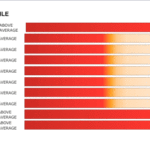Shift: Transform your career by shifting: Shift 8: From Informing To Informing And Transforming
What is easier – working with a person to understand the limits and biases in their thinking and then helping them change their thinking, or giving them leaflet?
Is it easier to listen to a person’s career story, and help that person discern the emerging fractal patterns in the story, or point them towards a list of occupations on a website?
Do careers professionals want to be seen as a carbon equivalent of this machine on the Embarcadero in San Francisco that dispenses copies of the Chronicle – is that all that is needed?
Shiftwork is the work we have to do to manage, thrive and survive in a world where shift happens. I’ve identified 11 shifts that we have to make (see here), so far I’ve addressed the first seven, and in this post, I address the eighth shift. The earlier ones you can read by following these links:
- first shift Prediction To Prediction And Pattern Making (see here)
- second shift From Plans To Plans And Planning (see here)
- third one From Narrowing Down To Being Focused On Openness (here)
- fourth shift From Control To Controlled Flexibility (see here)
- fifth shift From Risk As Failure To Risk As Endeavour (see here)
- sixth shift From Probabilities To Probable Possibilities (see here)
- seventh shift from Goals, Roles & Routines to Meaning, Mattering and Black Swans (see here)
Career counseling is the single most effective career intervention that produces the greatest gains for clients in the shortest time (Oliver & Spokane, 1988; Whiston, 2000). The superiority of career counseling over more constrained approaches such as workshops, classes and computer programs is due in no small part to the flexible, contingent and personal nature of the counseling process.
And yet, why is it, that it is much more likely that most people who have access to careers services are more likely to be given information as a substitute for counseling?
Part of the answer is that information provision is relatively easier and cheaper to provide than counselling. The web is a perfect medium to provide accurate, easily updatable and localised information at next to zero cost per individual. These are the sorts of benefits that get the attention of Politicians and funders. And this in part explains the increasing trend toward information provision being seen as the be all and end all of career development services, at least for those populations dependent upon government-funded programs such as high school and college students, graduates, the unemployed, and to a lesser extent those in rehabilitation programs
Sadly there are also “practitioners” who through laziness, apathy, or circumstance are content to simply distribute leaflets, as it suits their workshy tendencies, or for the more enlightened, they reason, correctly, that they have not been adequately trained to do any significant counseling.
This reinforces social inequality as access to quality counseling tends to be reserved for the wealthy (Pryor & Bright, 2006). Ironically, a fact that is often not addressed by those who seek to criticize the use of testing in career development claiming it to be expensive and driven by profit motives, is that testing can often be significantly cheaper to provide than counseling. However both of these methods are significantly more expensive than information provision.
What is happening is that increasingly careers services are being encouraged or coerced into making career information their primary purpose. This creates significant distortions because any other service, like counseling, then stands out as extremely resource instensive and expensive, making it vulnerable to cuts. Staff get hired without the capacity or interest in counseling, and budgets are trimmed to a printing allowance and a few subscriptions to on-line information sources (for the well resourced centers!).
Information provision is implicitly being presented as a proxy or alternative to counseling. The implicit assumption is that most clients need only to access the correct information, and that through some process of “true reasoning” will synthesize this into a coherent and effective career decision. It is almost as though there has been a process of transference of Parsons’ “true reasoning” from the counselor to the client over the last 100 years.
However little or no evidence is presented in support of the view that clients do process the information in an effective manner. In other words it takes more to make an appropriate career decision than good or plentiful information. For instance clients with self-limited self-views are likely to select limited information and then make limited decisions on the basis of that limited information. It is a recipe for failing to reach personal potential and continuing or exacerbating their underlying career issues. It also represents lost economic capacity, social mobility and workforce flexibility when considered from a labor market (ie a Politician’s) perspective.
 My concern is, increasingly the transformation element of the career development role is being cut, displaced and outsourced to our clients with no evidence to suggest that those clients or those that surround them like family and friends have the ability to do this aspect of the work effectively.
My concern is, increasingly the transformation element of the career development role is being cut, displaced and outsourced to our clients with no evidence to suggest that those clients or those that surround them like family and friends have the ability to do this aspect of the work effectively.
Career development is not solely about information and never has been. Transformation is at the heart of what we do. Transformation is a not an automatic process. It is not something that all of our clients are able to do by themselves. Indeed, as web access becomes close to being universal, it is information that is available to all, and as digital literacy improves, it is career information that most can access with little or no external support. At a time when career services are being forced, encouraged or choosing to arrange themselves primarily around information provision, they risk offering a service that is less and less required as the information they convey is readily accessible directly at home via the web. Careers services run the risk of trying to become a newspaper at a time when newspapers are going out of business for the very same reasons.
We need to make the shift to not only provide information, but to also provide transformation. And that means investment in training and hiring qualified counselors. It means beefing up standards and training courses to offer much more in-depth counseling training than is currently available. It means offering, in Dan Pink’s (2005) words, high-touch services, as well as high tech services.
There is still a role for information, hence the Shift to Informing AND transforming. As Bright & Pryor (2008) point out, career information continues to be a vital element in career development, however career information is merely an ingredient in career transformation. Shiftwork eschews reifying information and recognises how new information technologies can free us up to be more effective. The counseling process itself can also benefit from the use of information technology and some such as Lewis and Coursol (2007), Chester and Glass (2006) and Gredge (2008) report on already
developed effective models that harness podcasting and email in career counseling. Social networking sites such as LinkedIn, MySpace, Facebook and YouTube are already
being used by job hunters to advance their credentials, and possibilities exist using these technologies and others such as Voice Over Internet Protocols to develop
internet-based individual and group counseling sessions for minimal costs. Such approaches may overcome some of the cost and distance barriers to accessing
affordable and effective career counseling.
References
Bright, JEH & Pryor, RGL. (2008). Shiftwork. A Chaos Theory of Careers Agenda for Careers Counselling. Australian Journal of Career Development, (vol 17, Number 3, Spring 2008, 63-72.
Chester, A., & Glass, C. A. (2006). Online counselling: A descriptive analysis of therapy services on the internet. British Journal of Guidance and Counselling, 34(2). 145–160.
Gredge , R. (2008). Online counselling services at Australian universities. Journal of the Australian and New Zealand Student Services, 31, April, 4–22.
Lewis, J., & Coursol, D. (2007). Addressing career issues online: Perceptions of counselor education professionals. Journal of Employment Counseling, 44(4), 146–153.
Oliver, L. W., & Spokane, A. R. (1988). Career-intervention outcome: What contributes to client gain? Journal of Counseling Psychology, 35, 447–462.
Pink. D. (2005). A whole new mind. Allen & Unwin.
Pryor, R.G.L. & Bright, J.E.H. (2006). Counselling the Australian Perspective. Applied Psychology an International Review.
Whiston, S. C. (2000). Individual career counseling. In D. A. Luzzo (Ed.), Career Counseling of College Students. Washington DC: American Psychological Association.
Related Posts










Pingback: Transform your career by shifting: Shift 9: From Normative Thinking To Normative And Scalable Thinking | The Factory
Pingback: Transform your career by shifting: Shift 11 - From Trust As Control To Trust As Faith | The Factory
Pingback: Transform your career by shifting: Shift 10 - From Knowing In Advance To Living With Emergence | The Factory